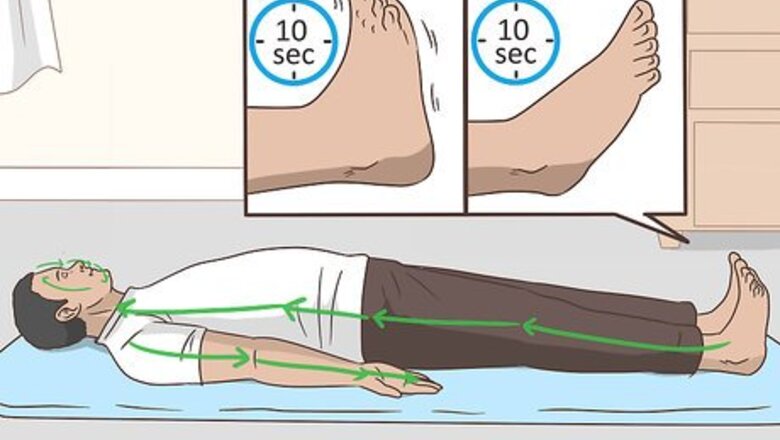
views
X
Trustworthy Source
American Academy of Family Physicians
Organization devoted to improving the health of patients, families, and communities
Go to source
Although most common in children, nightmares can happen to anyone, in many cases disrupting sleep.[2]
X
Trustworthy Source
PubMed Central
Journal archive from the U.S. National Institutes of Health
Go to source
If you have experienced a nightmare or recurring nightmares that wake you up, you may find it difficult to fall back asleep and/or get the images out of your mind. By relaxing and actively coping with your nightmares, you may be able to more easily get back to sleep and banish further scary dreams.[3]
X
Research source
Getting Back to Sleep
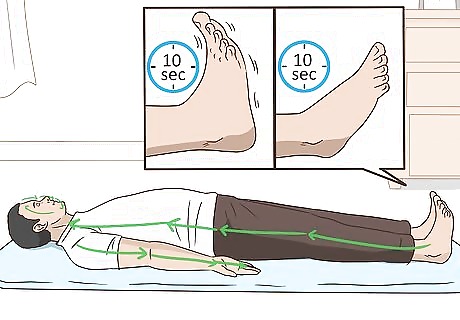
Relax your body. In most cases, a person will wake up suddenly because of a nightmare. This sudden shock to your system from fear can cause your heart rate to rise. By tensing and relaxing your muscles, you may be able to return your heart rate to a normal level and easily drift back to sleep. Tightly tense and release muscle groups by beginning at your toes and ending with your forehead. Tense muscles for about 10 seconds and give them 10 seconds to release. You may find that taking a deep breath in between further relaxes you.
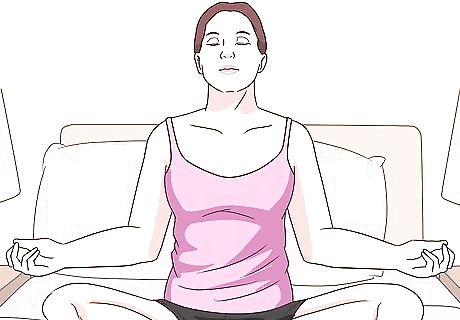
Calm yourself with meditation. In addition to higher heart rate, you may also be experiencing rapid breathing and anxiety as a result of the nightmare. Meditation can help lower your heart rate, return breathing to normal, decrease anxiety, and enhance relaxation. Meditating for a few minutes may help your body calm down and fall back asleep quickly and easily. Allow your breath to flow naturally without controlling it. This may greatly increase your relaxation and bring your heart rate back to normal more quickly. Allow your thoughts to come and go. This may help you more readily let go of the images from your nightmare. If you're finding it difficult to refocus your mind and relax, try repeating “let” with every inhalation and “go” with every exhalation.

Distract your mind. If you can't fall asleep within a few minutes of waking from a nightmare or the images continue to disturb, do something to distract your mind. You may want to get out of bed for a bit or do another activity, which could help relax you enough to eventually become drowsy enough to fall back asleep. Go someplace where you relax. Try reading or listening to soft music, both of which can distract your mind and relax you.
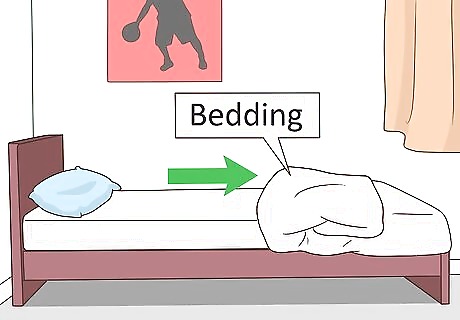
Remove some bedding. Many people experience sweating along with the other physical and emotional symptoms of a nightmare. Remove some of your bedding to help cool off, which may in turn help you fall asleep more quickly. Having a higher body temperature can make it difficult to fall and stay asleep, so only remove what bedding you need to cool off and stay comfortable. Cover yourself with whatever you need to ward off chills and help you feel comfortable and safe. If you've soaked your bed because of sweating from a nightmare, you may want to remake your bed to help your relax and fall back asleep.

Ignore the clock. Watching time pass can increase the physical and emotional distress from your nightmare. Don't watch your clock if you can avoid it and you may feel that you are more readily able to relax and return to a peaceful slumber. Turn the face of the clock away from yourself. If the clock is wall-mounted, do your best to ignore it.

Maintain a consistent sleep schedule. Sticking to the same bedtime and waking time every day can help you to fall back asleep if you wake up. You may also find that this helps control the frequency with which you have nightmares. Try and go to bed and wake up at the same time every day. This establishes your body's natural rhythms. Aim to get between 7.5 to 8.5 hours of sleep every day.
Coping with Nightmares
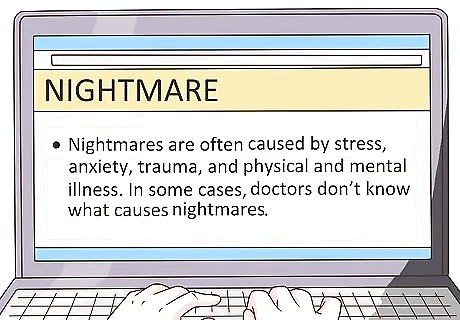
Learn about nightmares. Educating yourself about the causes of nightmares and the ways in which to prevent them can help you successfully cope with and manage your nightmares. As a result, you may find that you are less stressed as a result of missing sleep or disturbing images and can get the sleep your body needs. Nightmares are often caused by stress, anxiety, trauma, and physical and mental illness. In some cases, doctors don't know what causes nightmares. Although nightmares can seem harmless, they can actually significantly affect you and your ability to function because these scary dreams are disrupting vital sleep time. Most nightmares occur about 90 minutes after you go to sleep and this pattern can continue throughout the night, significantly impacting your ability to relax and get much-needed rest.

Keep a dream diary. You may find that keeping a dream diary can help you learn about the source of your nightmares. Any time you wake up from a nightmare, write down what caused the disruption in your sleep and any other factors such as diet or alcohol that may exacerbate scary dreams. Over time, you may notice patterns that can help you take concrete steps to reduce or prevent nightmares. Place a small notebook and pen next to your bed so that you can write as soon as you wake up. If you don't like writing, keeping a small voice recorder next to you can be a good alternative. Take your dream diary to any doctor's appointments you may have to deal with your nightmare. This can provide your doctor clues about what is causing the bad dreams.

Wind down early to relax yourself. You need time to switch into nighttime and sleep mode. Giving yourself an hour or more to relax can signal your body and brain that it's time to sleep and may help to reduce or prevent nightmares. You may also want to avoid reading anything that is scary, too. Keep the lights in your home and bedroom dimmed to help signal your body and brain that it is time to wind down. Consider avoiding exercise within three hours of your bedtime to help your body temperature return to normal and minimize the stimulation of your brain.

Establish a pre-bed ritual. A fixed bedtime routine can further signal your body and brain that it's time to relax and go to bed. Do anything that helps you relax. A bedtime routine is an excellent way to reduce anxiety and stress that can cause nightmares and disrupt your sleep. Reading a light novel with the lights dimmed may reduce stress and anxiety and entertain you while not overstimulating your brain and senses. Drinking herbal tea such as peppermint, lavender, or chamomile while you read may further relax you and keep you asleep. Take a warm bath to promote relaxation and drowsiness.

Limit or cut out alcohol and drugs. There is evidence that alcohol and drugs such as marijuana or cocaine can cause nightmares. Limiting or quitting either substance altogether may control or prevent nightmares and help you get a better night's sleep. Do not drink more than 1-2 alcoholic drinks per day and stay away from any alcohol within three hours of your bedtime. Drinking caffeine or taking caffeine pills close to bedtime may also cause nightmares. Avoid caffeine within three hours of your bedtime. If you are having any problems quitting alcohol or drugs, see a doctor who can help formulate a treatment plan to quit.
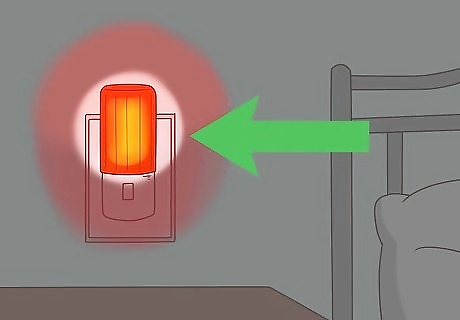
Illuminate a nightlight. Having a nightlight in your room may help more readily cope with nightmares by helping to re-orient yourself if you suddenly wake up. Choose a light that is a soothing and non-stimulating color such as red or orange. Place the nightlight near your bed if possible. You may also want to add others in your bedroom or other rooms of your home.

Reduce stress and anxiety. There is a lot of evidence that stress and anxiety are a primary cause of nightmares in adults. Lowering the amount of stress and anxiety in your daily life may reduce or prevent nightmares and help you get a better night sleep overall, which in turn can improve your ability to function. Avoid stressful situations as much as possible by removing yourself from them if you can. If not, consider taking a ten-minute walk to help you come down from the situation. Exercise is an excellent way to control stress and anxiety. Aiming to get at least 30 minutes of exercise most days of the week may help reduce and prevent your nightmares and ensure a full night's rest.

Alter nightmare storylines. Some research has shown that altering the storylines of your nightmares can help you to control and cope with them. Actively switch out terrifying aspects of nightmares with more positive images. You can work on story lines as soon as you wake up from a nightmare or even during the day. Look into your dream diary and write out new endings or elements to your dream, and remove anything that makes you uncomfortable. For example, if you dream that a giant sea monster eats you and your family, tell yourself or write in the notebook, “we got on the monster and rode it to a beautiful desert island and learned that the monster was a great entertainer.”

See a doctor. If you find that nothing alleviates your nightmares or they are severely disrupting your ability to sleep, see your doctor. She may be able to identify the cause of the dreams including stress, medications, or illness. Take your dream diary with you to help your doctor better assess the situation. Your doctor will likely ask you a series of questions to help her understand when the nightmares started and what factors may contribute to them. Your doctor may suggest you see a psychologist or sleep specialist to help manage or cure your nightmares. She may also prescribe medication to control nightmares.
















Comments
0 comment